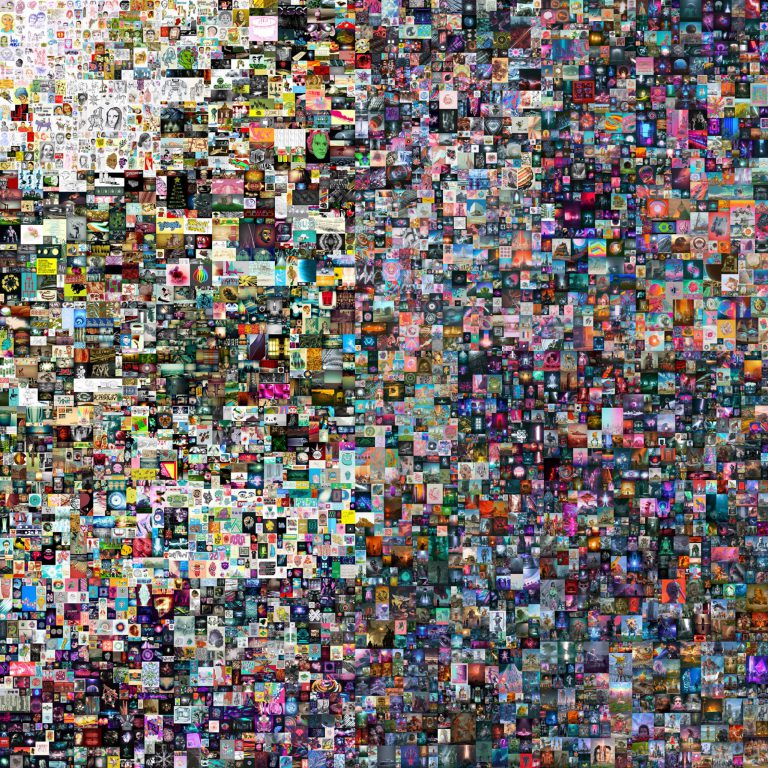Crypto-art (NFT art) has turned contemporary art into a money game!

We may be witnessing a historical moment without our knowledge.
In 1917, an artist named Marcel Duchamp exhibited a mere male urinal as an artwork called “Fountain” at the New York Independent Exhibition, an open call for entries, and was abused by the judges.
Almost 100 years later, in December 2004, Duchamp’s “Fountain” was named the most influential work of the 20th century by 500 British art world experts. This is said to be the birth of contemporary art.
A similar historical event occurred on March 11, 2021.
Everyday. The First 5000 Days” (Everyday: The First 5000 Days), a digital artwork by Beeple (real name Mike Winkelmann), a visual artist, was sold for the high price of approximately 7.5 billion yen. It was sold at auction at Christie’s. This is the third highest price ever. Incidentally, Jeff Koons was first and David Hockney second.
Christie’s, an auction house founded in 1766, is the first to offer purely digital art like “Everydays. A whopping 22 million people watched the moment of the 10-day online auction of this work.
Let me explain why a work by an almost unknown artist fetched such a high price.
This work is in a new field called “crypto-art” (some call it NFT art), which is digital art with inherent value using blockchain technology, which is also used for virtual currency. By attaching an NFT (non-fungible token), which records the owner’s information, to the cryptoart, it has the same “one-of-a-kind” value as an analog piece. Moreover, even if the work is resold to anyone in the future, the history of the work will remain in digital form and cannot be rewritten.
Blockchain came into the world as the technology behind virtual currency, but its superior mechanism has been applied in other fields, “cryptoart” being one of them. The cryptocurrency used in “cryptoart” is a blockchain called Ethereum.
The purchase of this work must be paid for with virtual currency (Ethereum, a different type of Bitcoin). Payment must be made via transfer to a digital wallet to Christie’s.
Now, this piece, “Everdays,” is the result of 14 years of Beeple making one piece every day since May 1, 2007, bringing the total to 5,000 pieces. Until now, he says, “I have never paid more than about 100,000 yen ($969) for my work.
◆An article from 2017, when I published my 3,650th piece after 10 years of creating one piece every day.
http://www.cbc-net.com/posts/2017/05/02/beeple-3650/
However, the signs were there a month before this high bid.
In February 2021, the same Biebl work, “Crossroad,” was purchased by art collector and NFT investor Pablo Rodriguez-Fraile, less than six months after its purchase. Within a year, it was resold for nearly 100 times the price it was purchased for (700 million yen = $6.6 million). The artist claims that he purchased the work because of its reputation in the art community, but this is dubious. Perhaps he heard about the investment value, not the art value. Or maybe they are the ringleaders!
It was not Christie’s, but the NFT trading platform “Nifty Gateway” that brokered this transaction. For the sale of “Crossroads,” the artist receives a commission when the work is resold; Nifty Gateway sets a 10% royalty, and Rodriguez-Frail For reselling “Crossroads,” Beeple should have received a resale commission of about ¥70 million.
Now, this “Everydays. Who won the bid for “The First 5000 Days”?
It was not an old-fashioned art collector, but a Singapore-based virtual currency fund called Metapurse. It was founded by Twobadour, the fund’s co-owner, and another anonymous investor, Metakovan, who is reportedly an old-time crypto asset investor.
https://www.metapurse.fund/
Metapurse” said the two men worked together to win the bid on March 11 from separate locations. They started bidding five minutes before the closing time, and the price, which was less than 2 billion yen ($20 million) at the time, had jumped to more than 6 billion yen ($60 million). This piece will be worth 100 billion yen ($1 billion) in the future,” Twobadour said.
Thirty-three people bid competitively in this sale, 91 percent of whom were new users. By age, Generation X (1965-1980) and Millennial (1981-1996) users accounted for 33 percent and 58 percent, respectively. In other words, 90 percent were first-time auctioneers, and 60 percent were between the ages of 25-40! These are not conventional art collectors.
According to a 2020 report by L’Atelier (L’Atelier BNP Paribas) and nonfungible.com, most of Beeple’s works sold for well over 10 million yen ($100,000), making the virtual currency market (digital token market) worth about 27 billion yen ($2 It is driving the crypto-art boom that has pushed it to the scale of $150 million.
Summary.
This successful bidding is a new type of money game for the purpose of resale, and it could be said to be a market manipulation that was possible because it is an emerging field where the rules are not well-developed, which is not possible in the stock market. Ordinary art collectors should not take this for granted and make speculative moves. It is like a stock that tripled in price from 2 billion yen to 6 billion yen in the last 5 minutes. With 22 million people watching it online, it is an alchemy that turned people’s desires into economic value.
In order to maintain the economic value of art for a long time, the “value of creativity” must be appreciated for a long time, or it may eventually crash.
Hope Beeple can be a Duchamp…
Jun Fukuda
◆ Reference
Platform for creating and selling NFT art
A platform where you can purchase artwork as long as you have a crypto wallet and virtual currency Ethereum (note that you can’t buy it with Bitcoin) without any screening, etc., and you can resell it or present it if you have your own artwork.
Rarible
https://rarible.com
Zora
https://zora.co/
Handling of works by celebrities, existing artists, etc. on a juried basis
Super Rare
https://superrare.co/
Nifty Gateway
https://niftygateway.com/
We handle not only art NFTs, but also many game items NFTs, etc.
OpenSea.
https://opensea.io/assets
◆How to buy crypto art?
Digital platforms are richer in works than the old auction houses.
For example, if you look at the “Nifty Gateway,” it looks like today they are presenting a new work by British artist D*FACE.
In case you are wondering, this film has already sold for $536,000 (55 million yen).
#repost @niftygateway
Instantly recognized as one of the UK’s most prolific Urban Contemporary artists, @dface_official has occupied the forefront of his practice since 2005.
His collection drops today starting at 1:30 PM EST
https://niftygateway.com/collections/dface
◆The man who bought Beeple’s work, shrouded in mystery, for 7.5 billion yen
Metakovan, mystery buyer of Beeple’s $69.3 million NFT art, reveals identity
http://www.ecoti.in/G6qtpY
Who is Vignesh Sundaresan, ‘Metakovan’?
He was born in India and is 33 years old. He graduated from Carleton University in Canada and is currently a startup entrepreneur in the virtual currency industry based in Singapore.
Vignesh Sundaresan aka ‘Metakovan’ is a Singapore-based blockchain entrepreneur, coder and angel investor. He has announced a $500,000 fellowship for ‘crypto storytellers’ funded by his crypto investment firm, Metapurse.
https://vigneshsundaresan.com/
◆Why did Metacovan buy just one JPEG for 7.5 billion yen?
MetaKovan on Why He Spent $69 Million on a Jpeg
https://unchainedpodcast.com/metakovan-on-why-he-spent-69-million-on-a-jpeg/





